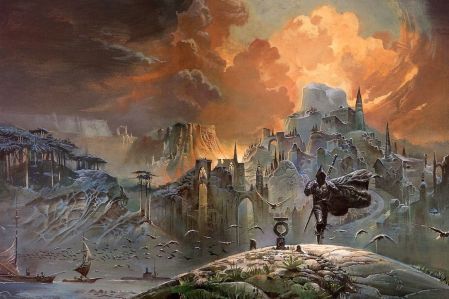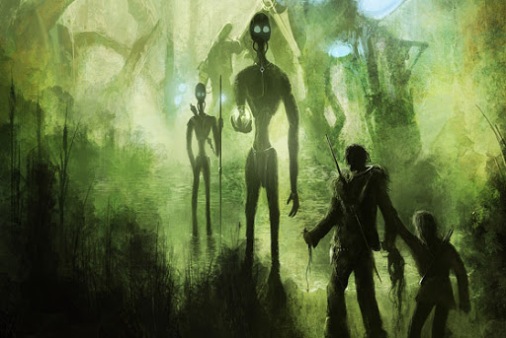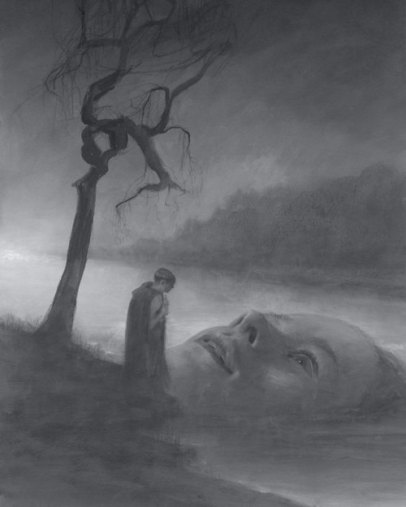Review: Book of the New Sun by Gene Wolfe
I just finished Gene Wolfe’s “Book of the New Sun,” a seminal four volume magnum opus in science-fiction’s “Dying Earth” sub-genre, in which we’re flung, headlong, into an inconceivably far-distant future where our sun is a dwindling red presence in the sky and humanity’s last children are bearing witness to the planet’s inevitable natural death.

The saga slowly and patiently unravels as a presumed fantasy work and reveals itself to be science fiction. Our protagonist, Severian, is a young apprentice in a guild of tortures/executioners. He is exiled from all he knows when he unforgivably shows mercy to a prisoner, allowing her to take her own life rather than be tortured. No spoilers here (because our narrator tells us this much in the opening pages): Severian goes on to wander, fight in a great war, and eventually become the autarch, the supreme ruler of the planet, where he then endeavors to accomplish nothing less ambitious than the resurrection of the dying sun itself.
This story will stick with me for the rest of my life.
I don’t say this lightly: Book of the New Sun is without a doubt the most singular thing I’ve ever read, the most ambitious narrative I’ve ever conceived of, and the most expertly-executed and disciplined work of inspired writing I’ve ever seen. It utterly stands alone and defies any comparison. Truly: a worthy pursuit for anyone who likes to think of themselves as a serious pupil of literature. But don’t take it from me. George RR Martin calls it, “One of the great science fantasy epics of all time.” Niel Gaiman hails it as, “The best SF novel of the last century.” And Ursula K. LeGuinn refers to Wolfe as, “Our Melville.”
BOTNS took me six months to complete. It’s not an easy read, and is best served by affording it more concentration than today’s readers are perhaps accustomed to. You must be willing to pay attention, to delve deep—and to cross examine its own unreliable narrator. Wolfe is never accidental. The most confusing moments are the ones you must scrutinize above all others.
 But I am not trying to discourage you, curios reader! On the contrary! BOTNS is gorgeously written, but it’s also a ton of fun! In fact, it’s downright COOL. It’s a swashbuckling adventure. There are swords and laser guns, aliens, cyborgs, robots, giants and ghosts, sea monsters and gods, spaceships and time travel. Romance and love and deception. It literally features an entire, written-out stage play within. At times it reads as deeply as a Hemingway or Stephen Crane war novel (Wolfe was, after all, himself a soldier who served on the ground in battle during the Korean War). (And he was also, incidentally, the inventor of the Pringle potato chip. Don’t believe me? Look it up. But I digress…)
But I am not trying to discourage you, curios reader! On the contrary! BOTNS is gorgeously written, but it’s also a ton of fun! In fact, it’s downright COOL. It’s a swashbuckling adventure. There are swords and laser guns, aliens, cyborgs, robots, giants and ghosts, sea monsters and gods, spaceships and time travel. Romance and love and deception. It literally features an entire, written-out stage play within. At times it reads as deeply as a Hemingway or Stephen Crane war novel (Wolfe was, after all, himself a soldier who served on the ground in battle during the Korean War). (And he was also, incidentally, the inventor of the Pringle potato chip. Don’t believe me? Look it up. But I digress…)
 BOTNS bleeds the crimson blood of Christian mysticism throughout–particularly Catholic mysticism–but it does so in the most appropriately-subtle and delicious ways. At times it is utterly haunting, or horrific, and genuinely scary. But BOTNS is undeniably at its best (and least challenging and most rewarding) when it slows down and reflects on itself, and the human condition, and the millions of years of future trajectory our species has in store, possibly over and over again, not only within this universe, but beyond the next Big Crunch and Big Bang, and the next one, and so on.
BOTNS bleeds the crimson blood of Christian mysticism throughout–particularly Catholic mysticism–but it does so in the most appropriately-subtle and delicious ways. At times it is utterly haunting, or horrific, and genuinely scary. But BOTNS is undeniably at its best (and least challenging and most rewarding) when it slows down and reflects on itself, and the human condition, and the millions of years of future trajectory our species has in store, possibly over and over again, not only within this universe, but beyond the next Big Crunch and Big Bang, and the next one, and so on.
This book is dizzying, and dreamlike, at times confusing and even frustrating. But above all it is singular–and singularly masterful. It is an experience all to itself, something very rare indeed anymore…in these days when it’s generally conceded that there’s no such thing as anything new…under the sun.
Leave a comment